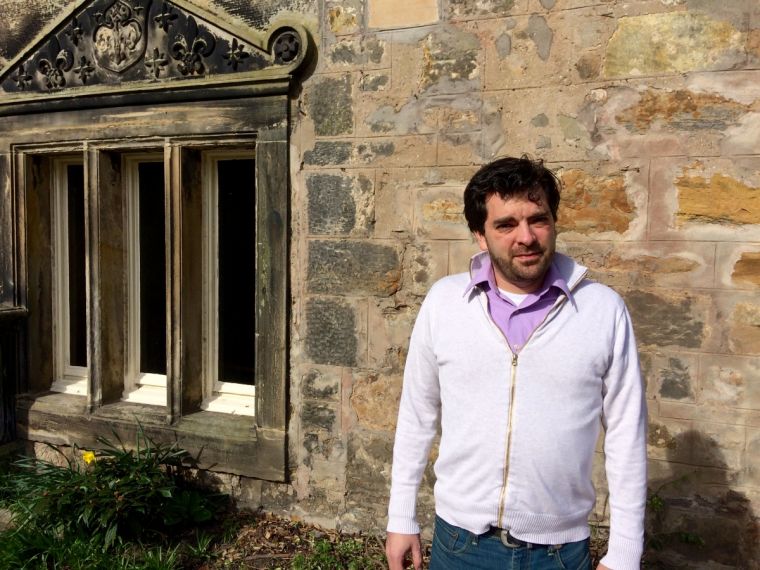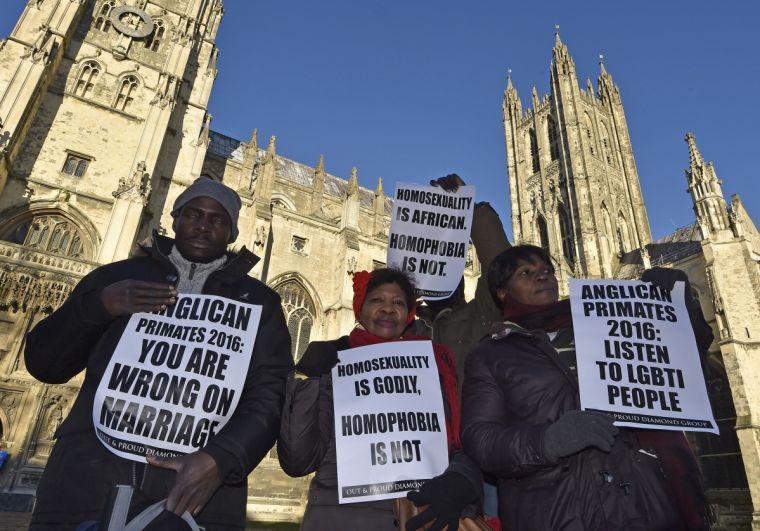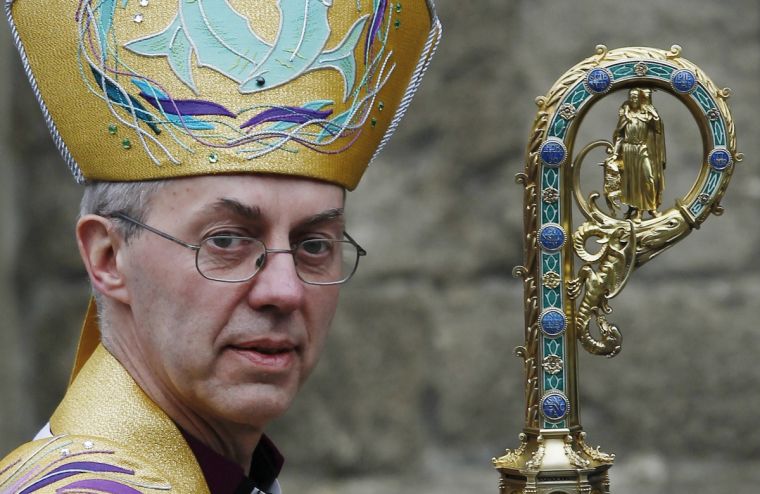Tribes, tensions and gay marriage: What's the future for the Church of England?

It's no secret that the Church of England has been in turmoil of late. Internal tensions over impassioned positions on human sexuality and church leadership have dominated ecclesial news. Can 'good disagreement' in the broad church prevail, or will persistent division provoke a painful divorce?
The Archbishop of Canterbury has spoken openly about a vision for 'good disagreement' in the Church, making space for opposing sides on heated issues to share peaceful co-existence. However, vocal public conflict has persisted following the latest General Synod, where a 'traditional' report on human sexuality was put aside and Archbishop Justin Welby called for 'a radical new Christian inclusion in the Church'.
With both traditionalists and liberals finding themselves side-lined by those who oppose them, the project of 'good disagreement', as Andy Walton wrote, doesn't look to be faring too well.
Can the Church of England hold it together, particularly on the increasingly tense question of same-sex marriage? What about the global coalition of the Anglican Communion? Christian Today spoke to Dr John Perry, an expert in theological ethics at the University of St Andrews, about sexual ethics, church tribalism and how novel yet ancient ways of thinking may offer a hopeful way forward.
Tribal warfare
'We don't just have camps that disagree, we have camps that are more like tribes,' says Perry of increasing conservative and liberal divisions in the Church.
He explains: 'The camps that disagree don't just disagree, it's that they live in a world where they're surrounded by people that make their position look like the majority, default position that everyone accepts.
'Right now, in Canada, the US Episcopal Church, and in the UK, the dominant view is going to be the liberal position that supports Church liturgies for gay marriage. Because that's the dominant position not just in church but in wider society...it's very hard to realise that elsewhere in the world that's still very much the minority position.'
Likewise, Perry says, 'If you go to Nigeria, Ghana, much of India [where the disposition is far more conservative] it's just as hard there to imagine how that view isn't shared by everyone else in the world.
'I have to challenge students on this, who say "Well, we know now, 'x' about gay marriage" – well, who is the "we" in that?'
From a global perspective, Perry says liberals in particular need to bear in mind 'how awfully colonialist it looks for First-World Europeans and Anglo-Americans to say "Those backward Africans don't know what they're talking about when it comes to marriage." That is really awful. "If they just would learn from us white men they wouldn't have their disagreements."'
It's an 'ironically politically incorrect thing for a liberal to be saying' but also, Perry says, 'It shows a complete lack of willingness to think yourself into the perspective of the person that disagrees with you.'

In an increasingly polarised society then, Perry says he likes Archbishop Justin Welby's ambition for 'good disagreement', something he says has clearly been in decline of late. The value of seeing reality 'from outside the world in your own head' is profound, and 'way harder to do than people typically think'.
How did we get here? The internet of course, and social media platforms like Twitter, exacerbates hostility, limits space for clear communication and minimises the essential 'face-to-face' element of human engagement. A far deeper cause, however, is rooted in western liberal democracy.
'The way western society dealt with disagreements in the centuries following the Reformation...was instead of a focus on what's "good", was a focus on rights and rules – what's called proceduralism,' Perry says.
This approach essentially said: 'You and I might disagree about the meaning of life, but maybe we can agree on these bare minimum questions of what it means to live together.' This was the project of liberalism: 'a democratic, human rights based approach to politics'.
Perry calls this the 'American family at thanksgiving approach' – a happy communion, so long as no one mentions religion or politics.
Unfortunately, Perry says: 'When you decide not to talk about these things in order to help thanksgiving dinner go smoothly, you lose the ability to talk about them well.'
However, there may yet be hope for good disagreement in particular communities, and sometimes the division is overstated. People get angry, they say nasty things online, but as Perry says, 'there aren't literal wars of religion'.
The deeper division is 'global disagreement' that particularly the Anglican Communion faces. The CofE's Synod debates, for example, aren't just about England. The CofE is 'caught between conservative African and liberal American bishops', and its prominence in the communion mean others will take its positioning as a sign of the assembly as a whole. A persuasive kind of disagreement, that might result in a shared set of convictions, is globally speaking far more ambitious. Both liberals and conservatives, with 'extraordinary nastiness' at times, have displayed a desire to protect a camp for their own convictions.
'There are plenty on both sides who would prefer to see a break-up for the sake of protecting what they see as purity,' Perry says. 'It's very easy to conclude that this is a marriage headed for divorce.'
Nonetheless, remarkably, Perry is still optimistic. Slavery once divided churches in the US, and no longer does. In time, 'it might just be that we become comfortable living with the disagreement'.

A new theology of marriage?
If the church is to transcend its present conflict and remain a family – an attempt some would argue is fundamentally misguided if it concedes too much to the opposition – then both conservatives and liberals may need to look to a new – yet ancient – theology of marriage.
The Church father Augustine is sometimes caricatured as a sexually repressed individual with a stern, highly conservative approach to sexuality. But Perry, drawing on the work of ethicist Oliver O'Donovan, points to his teaching as a potential resource for maintaining Church unity.
Augustine saw three essential 'goods' to marriage. First, it provides a context for close friendship. Second, it marks a commitment to raise children, should you have them. Last, it provides a context for a commitment to 'stick together through thick and thin', what Augustine calls a 'sacrament', a picture of God's own commitment to wayward humankind. 'Those are the things that make marriage good,' Perry says.
Notably, Perry highlights that Augustine didn't exclude the elderly, or infertile couples from his vision of marriage, even though they couldn't procreate. Not all three goods had to be in place for a 'good' marriage, and crucially, Perry notes: 'Those values by themselves wouldn't limit marriage to opposite-sex couples.'
Augustine's vision, Perry argues, provides a vision of marriage that at its core doesn't exclude same-sex couples. Perry suggests this would be a more useful way for progressives to make a case for same-sex marriage in the Church.
Too often, the debate is framed in terms of liberty, equality and emancipation from oppression. These are good things, Perry says, but they don't say enough. They are primarily political categories that 'can't necessarily help the Church think about marriage'.
Augustine's vision is historic, rooted in tradition, and provides a positive Christian framework of thinking, rather than a political approach that feeds off conflict. 'If disagreement is happening in the Church,' Perry says, 'then we should use the Church's language.' This approach may not immediately sway conservatives, or delight liberals, but it may offer a constructive map for the way ahead.
The CofE's current divisions cannot be easily dismissed. Like Britain and the EU, or US Republicans and Democrats, its drama embodies the challenges of committing to both diversity, unity and 'good disagreement'. It may be a marriage headed for divorce, or, to take Perry's optimism, it may find a new way forward.
As Perry says: 'Part of what the Church does is give people a way to stand against dominant values that are bad values.
'Church can be a place that says, 'You're not defined by how you look, how much you weigh, what kind of car you drive, all of the things that wider, consumerist society would say.
'The Church is a place that says 'You're valuable' because of something more important than your weight. To say that in our society makes you weird. I hope the Church can protect that.'
You can follow @JosephHartropp on Twitter











